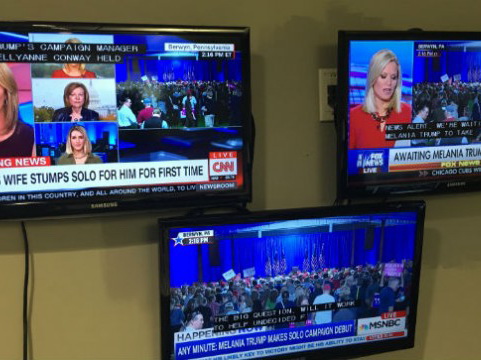Fake news and Human Rights Watch’s role

By Maayan Jaffe-Hoffman, Opinion Contributor
The media is among the loudest voices against the spread of “fake news.” But the media is also the greatest culprit – intentionally or not.
How can media outlets “unintentionally” spread lies? The answer is laziness…as when they take a press release and simply disseminate its content without verification or fact-checking. The results can be dangerous misperceptions.
Recently, a former AP correspondent wrote, “The news tells us less about Israel than about the people writing the news.” Often, in places like Israel, misreporting stems from media outlets picking up reports by non-governmental organizations (NGOs), such as Human Rights Watch (HRW) or Amnesty International (AI), and printing them without any independent verification as to the accuracy of their claims.
Reports by NGOs from war-torn areas can be wildly inaccurate because these organizations simply don’t have the expertise or access to facts to make their claims, explains Anne Herzberg, legal advisor to the Israel-based watchdog NGO Monitor. “In many cases, groups like AI and HRW don’t have a local presence. They rely on claims from local NGOs themselves, and don’t verify this information.”
It’s like a game of telephone: Local NGO makes a claim. AI, HRW or another international NGO picks up that claim and passes it on to the media. The media then reports it.
“It’s several layers of failure,” says Herzberg.
Why are the media not being more careful? The halo effect. This is the idea that NGOs are seen as altruistic and without agenda (in other words, they would have no reason to falsely report the facts). But Herzberg says this is not always true.
Herzberg says NGOs, like any other business, have an end-goal in mind. For example, an NGO might report a conflict is intensifying or violence increasing to justify their work to funders. Similarly, an NGO might have a lobbying agenda, which leads it to report a story in a particular light.
Other times, NGOs’ false claims are rooted in ignorance. In places like Israel, Herzberg says, many local nonprofits in Gaza Strip can be tied to terrorist groups. When HRW picks up their claims, they are essentially reporting the claims of terrorists as facts.
During the 2014 Gaza war with Hamas, false reporting of casualties became a widespread challenge. The casualty information originated with Hamas, who supplied it to local NGOs. These NGOs repeated Hamas’ claims to AI and HRW, who then published reports. The information was so many steps removed from its origins, that the media – let alone the public – did not know they were getting fake news. Later, when the dust settled, and internal investigations conducted, the facts appeared very different.
We see a similar phenomenon happening in other countries. For example, in mid-January, as part of its 687-page World Report on human rights practices, HRW reported on Azerbaijan. In a summary, HRW made the sweeping claim that “The government’s crackdown [on independent organizations] is threatening the survival of independent activities in Azerbaijan” and accused the government of “assaulting its critics.”
Scroll down to the endnotes and one sees most sources are HRW.
Azerbaijan by no means has a perfect human rights record. However, the HRW report makes a country with a constitution that defines the country as a "democratic, legal, secular and unitary republic" – and that has far surpassed most other ex-Soviet republics on matters of human rights – look like South America in the 1970s. In the same terms, a Freedom House report lists North Korea as “partly free” but Azerbaijan as “not free,” --ridiculous.
Perhaps what HRW is painting as “assaults against its critics,” is the government’s zero-tolerance for religious extremists. But we don’t know, because we don’t know from where HRW’s information originated.
HRW and AI are not news outlets. However, their work is routinely reprinted by the media. As such, when they report information they could not possibly know with certitude, those reports are equivalent to fake news.
One worries about the state of U.S. journalism. Fact-based journalism is not-so-slowly going by the wayside to be replaced by fanciful social media threads and personal blogs disguised as news. Free and accurate media is a foundation of a healthy democracy.
If NGOs are attacking democratic countries and U.S. allies, using the unethical tactic of reporting their claims as verified facts (“news”), then something should be done about it.
One solution is to apply a law like the Foreign Agents Registration Act of 1938 (FARA) to NGOs. The FARA law requires foreign-government-influenced media outlets to disclose the origin and purpose of the information they are reporting to help readers develop an accurate understanding of the source. Applied to NGOs, FARA would ensure readers their right to know where these NGOs got their “facts” and on whose behalf they are reporting their claims.
Maayan Jaffe-Hoffman is director of international communications at a leading Israeli think tank, Israeli correspondent for eJewish Philanthropy and a regular freelance writer.














